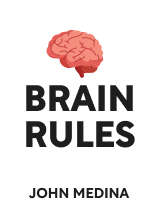

This article is an excerpt from the Shortform book guide to "Brain Rules" by John Medina. Shortform has the world's best summaries and analyses of books you should be reading.
Like this article? Sign up for a free trial here .
What are the ways exercise and the brain work together? Does the brain function better thanks to exercise?
In his book Brain Rules, Dr. John Medina theorizes that exercise and the brain go hand-in-hand when striving to achieve greater health. Knowing how the brain benefits from exercise can help build a stronger mind and body to improve cognitive and physiological skills.
Let’s look at why and how brains thrive from physical activity.
Exercise Enhances the Body and Brain
Medina argues that our brain function is highly influenced by whether or not we exercise, and that more exercise feeds the brain. He explores why we’ve evolved to exercise frequently, how exercise and the brain benefit from one another, and how sedentary lifestyles harm them. He then describes several important truths that illustrate exercise’s importance.
Our Bodies Want to Exercise
According to Medina, our ability and desire to exercise are baked into our biology. Humans had to contend with intense environmental conditions, and constant motion was necessary for survival. For example, when early humans migrated from shrinking rainforests into vast, dry savannahs, they had to walk and run long distances to find food and shelter and to fend off hostile wildlife. Early humans traveled as much as 12 miles a day. Our bodies are still designed to exert such high levels of energy.
| Did We Evolve to Exercise or to Conserve Energy? Daniel Lieberman, a professor of human evolution and biology at Harvard University, argues that exercise and the brain were always meant to work together. Rather than evolving to exercise, we evolved to conserve energy. Conserving energy was important during times of limited food supplies, and allowed early humans to use more energy for physical activity when they needed to, like if they were hunting for food or fleeing a predator. This is why today, many people now would rather relax than go exercise, and the brain might suffer for it. Lieberman does agree, however, that hunter-gatherers were more active than people now and that they walked several miles every day. He also agrees that walking regularly has major health benefits. So while Medina and Lieberman disagree on whether we’ve evolved to exercise or to conserve energy, both would agree that our brains benefit from regular exercise. |
Our Brains Want to Exercise
Given that we’ve evolved to exercise, and our brains as well, our bodies reap not only physical but also mental benefits from physical activity. Exercise boosts cognition by increasing blood flow to the brain, resulting in more power. When we exercise, our bodies create new blood vessels, which allow blood to circulate more efficiently. This brings more oxygen-rich blood to the brain.
The oxygen serves two functions: It feeds our brain cells—helping neurons stay young and operational—and it removes harmful toxins. Increasing the flow of oxygen, then, immensely helps the brain carry out its essential functions, including cognitive abilities like memory, focus, and problem solving.
| Exercise May Benefit Those With Memory Loss in an Unexpected Way Exercise and the brain have a surprising connection when it comes to memory loss. Most people benefit when they get increased levels of oxygen to their brain. However, some people suffer from the opposite problem: too much oxygen to the brain, which can hurt memory function. This can happen in people with mild cognitive impairment (MCI), when their bodies pump excess blood to their brains in an attempt to make up for their reduced cognitive function, which ironically exacerbates that reduced function. One study found that for adults with MCI, exercise helped regulate their blood flow, which reduced the excess flow to their brains. Participants in the study saw improved scores on cognitive tests when they exercised. |
Exercise Versus Modern Life
Medina argues that even though exercise has proven to boost brain power, the structures of contemporary life often prevent exercise, which has detrimental effects on our brains. Contemporary life has led to sedentary lifestyles: Many jobs necessitate sitting down for large portions of the day, and school requires kids to sit for hours at a time as well. Because of these sedentary lifestyles, many people suffer cognitive consequences, particularly as they age.
(Shortform note: According to a recent study, sitting for long periods of time is associated with the thinning of the MTL, a part of the brain that forms new memories. Over time, MTL thinning can lead to cognitive decline and dementia.)
Medina encourages finding ways to incorporate exercise and brain-work into daily routines, even if it’s not what you’re used to. For instance, he recommends walking on a treadmill while working.
(Shortform note: Since Brain Rules was published, many people have begun using treadmill desks. Like Medina, many people believe that treadmill desks can help incorporate light exercise into your work day.)

———End of Preview———
Like what you just read? Read the rest of the world's best book summary and analysis of John Medina's "Brain Rules" at Shortform .
Here's what you'll find in our full Brain Rules summary :
- An explanation of how the brain works in a simple and accessible way
- The 12 rules that help fulfill the core functions of the brain
- How to improve your thinking and learning abilities






